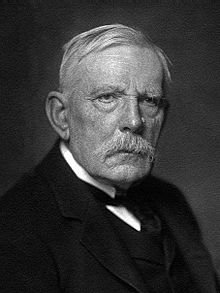|
Ferdynand Radziwiłł
Prince Ferdynand Fryderyk Radziwiłł (1834 in Berlin – 1926 in Rome) was a Polish nobleman and Polish-German politician. Early lifeHe was the son of Bogusław Fryderyk Radziwiłł and Leontyna von Clary und Aldringen. Through his paternal grandmother, Princess Louise of Prussia, he was a cousin of the German Emperors. He was educated in Berlin and received a law degree.[1] CareerDuring the Franco-Prussian War, he served as a soldier in the German army for one year.[1] For much of his life he lived in the German Empire, where he was a member of the German parliament (Reichstag) from 1874 to 1918. He was known as an important leader of the Polish minority and opponent of the Germanization and Kulturkampf policies. Prior to 1885, his political concerns fell mostly with the relation of the Church to the Kulturkampf.[1] In 1901, he gave a speech at the Reichstag to protest the treatment of Polish school children in Września.[2] In the speech, he denounced the alleged use of corporal punishment on children, noting that bonuses were paid to teachers who taught the most German. In response, Count von Bülow said that "foreign sentiments" could not influence domestic policy, and that Germans in the east will not "fall beneath Polish wheels."[2] Bülow concluded by stating that efforts to bring about an independent Poland would be opposed.[2] In 1908, he spoke out against expropriations.[1] After Poland regained independence in 1918, he became a Polish citizen and a member of the Polish parliament (Sejm). His political activity ended in 1919.[1] In February 1926 he died in Rome.[1] FamilyHe married Pelagia Sapiezanka in 1864. They had five children. Ancestry
ReferencesInformation related to Ferdynand Radziwiłł |
||||||||||||||||||||||||||||||||||||||||||||||||||||||||||||||||||||||||||||||||||||||||||||||||||||||||||||||||||||||||||||||||||||||||||||||||||||||||||||||||||||||||||||||||||||||||||||||||||||||||||||||||||||||||||||||||||||||||||||||||||||||||||||||||||||||||||||||||||||||||||||||||||||||||||||||||||||||||||||||||||||||||||||||||||||||||||||||||||||||||||||||||||||||||||||||||||||||||||||||||||||||||||||||||||||||||||||||||||||||||||||||||||||||||||||||||||||||||||||||||||||||||||||||||||||||||||||||||||||||||||||||||||||||||||||||||||||||||||||||||||||||||||||||||||||||||||||||||||||||||||||||||
